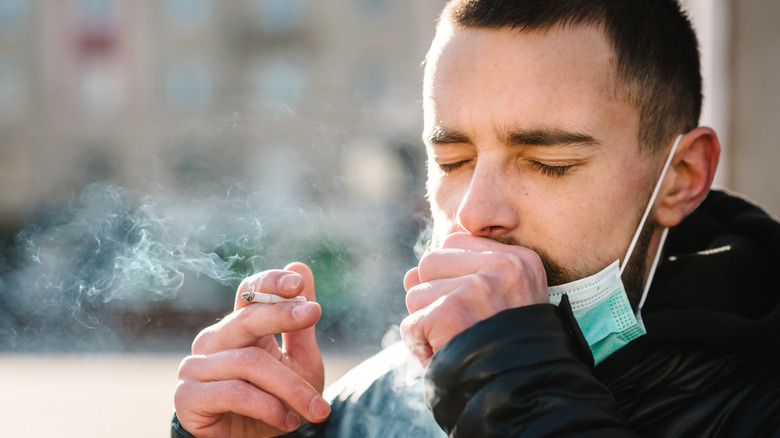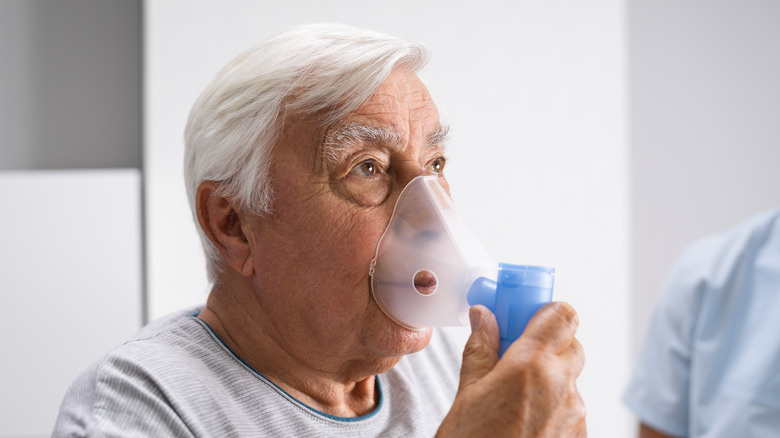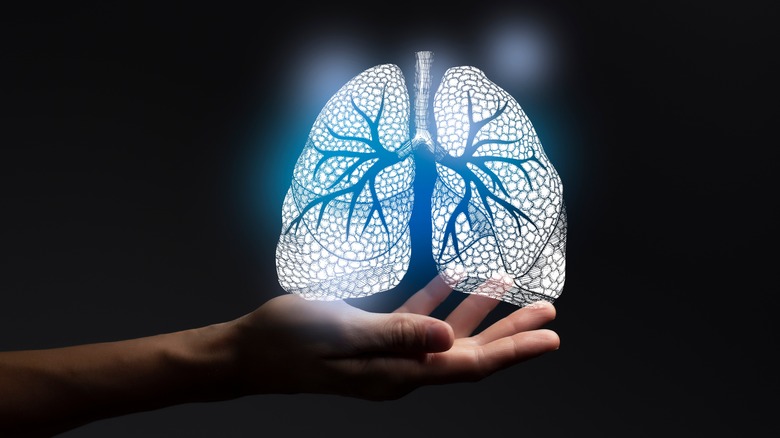Myths You Should Stop Believing About COPD
Our lungs are constantly working, bringing oxygen into our bodies and expelling carbon dioxide out around the clock. But just like our other organs, the lungs are susceptible to developing conditions, and chronic obstructive pulmonary disease (or COPD) is one such condition that causes issues for millions of people yearly.
COPD, a chronic disease that develops over time, occurs when the airways in your lungs become narrower, making it harder for air to pass in and out, as the World Health Organization (WHO) states. This can then lead to increased trouble with breathing, chronic fatigue, progressive difficulty with going about one's day-to-day life, and ultimately death due to the condition.
The good news, though, is that COPD is treatable, and its speed of progression can be reduced –- but the bad news is that COPD can remain a mysterious disease, with an abundance of myths circulating about it. So what's the truth? Can you exercise when you have COPD? Is it only something that impacts older people? And is it just like asthma? We've got all of the answers you need right here.
Myth: You only get COPD if you smoke
The development of chronic obstructive pulmonary disease is commonly attributed to smoking cigarettes, and indeed, a large proportion of COPD cases directly stem from a smoking habit, according to the Centers for Disease Control and Prevention (CDC). But that's far from the only cause of the condition. People who have never smoked and then go on to develop COPD make up a significant proportion of those with the disease, as research from the CDC shows, and inhalation of secondhand smoke is often considered a factor. Bear in mind that this secondhand smoke doesn't need to be from cigarettes specifically, but can be from any devices that burn tobacco, like pipes, hookah pipes, or cigars.
People may also be likely to develop COPD if they work or live in an environment where they're exposed to certain fumes regularly, says the National Health Service (NHS). Inhaling welding fumes, silica or coal dust, and even grain or flour dust can all be potential causes of COPD. There's ongoing research, too, looking at the impact of living in an area with significant air pollution and how that may heighten the risk of COPD. Genetics could also be a factor in developing the condition.
Myth: COPD only affects older people
COPD is frequently associated with older adults, and is seen by many to be something that only affects those who are in their later years. But this isn't entirely the case. COPD is a condition that occurs thanks to continuous lung damage throughout a person's life, and this cumulative effect, combined with the declining ability of cells to repair as we get older, means that it is indeed way more common amongst the elderly (per Medical News Today). Younger people, conversely, have a much better capacity for recovery from lung damage — so if contact with potential toxins is stopped before they sustain irreparable injury, they may be less at risk.
However, young people are still capable of developing COPD, especially if they're exposed to irritants like cigarette smoke or pollution regularly. Certain people may also have a higher genetic predisposition to COPD if they have an alpha-1 antitrypsin (or AAT) deficiency, which means that their lungs are less capable of recovering when damaged. As many as 100,000 people could have an AAT deficiency in the U.S., says the American Lung Association, and in these individuals, COPD can develop relatively easily.
Myth: COPD is purely lung-related
Given that COPD specifically manifests in the lungs, it's easy to assume that if you have the condition, it exists in isolation from other diseases or parts of the body. But in fact, chronic obstructive pulmonary disease has a strong relationship to various other conditions. "COPD coexists with many comorbidities, including heart disease, lung cancer, hypertension, osteoporosis, and diabetes," states Mount Sinai Icahn School of Medicine's professor of medicine Neil Schachter to Medical News Today. Schachter states that a lot of the things that cause or raise the risk of COPD — such as smoking, which is a huge risk factor for lung cancer, as the NHS states — also elevate your risk of developing these other conditions.
Schachter also notes that "systemic inflammation" can be a contributing factor to both COPD and these comorbidities. Systemic inflammation occurs as an immune response and leads to continuous inflammation through the whole system, which can have a knock-on effect on disease development, not only for COPD but for a host of other conditions (per the National Gaucher Foundation). If you're concerned about inflammation or the risk of these comorbidities, it's important to speak with your doctor.
Myth: The sole symptom is shortness of breath
As COPD impacts your lungs, reducing the width of your airways, difficulty breathing or shortness of breath is a common symptom, particularly when people are physically exerting themselves (per the Mayo Clinic). But it's far from the only sign that you have COPD. Other symptoms relating to breathing such as wheezing or a feeling of tightness in your chest and around your lungs can also indicate COPD. Chronic obstructive pulmonary disease can also produce more generalized symptoms like fatigue, swelling in the lower portions of your legs, and weight loss (and of course all these can also be signs of other conditions).
People with COPD may also be more likely to contract respiratory infections, and can often have a phlegm-producing cough. It's also worth bearing in mind that COPD symptoms will generally rise and fall in severity, and flare-ups of symptoms are common, which may take even more management. Generally, though, quick and thorough treatment of COPD will lead to a reduction or easier management of symptoms, but if you're finding that they're getting progressively worse, make sure that you seek medical assistance immediately. Heart palpitations, difficulty with cognitive function, or blue fingernail beds or lips are also signs that you should call your doctor right away.
Myth: If you smoke, you'll definitely get COPD
Chronic obstructive pulmonary disease and smoking are linked, and you're far more likely to develop the condition eventually if you're a smoker compared to if you've never touched a cigarette in your life, pulmonologist Thomas Yadegar says via Health Central. But you don't get COPD just because you smoke. The proportion of smokers who develop COPD compared to those who don't is relatively small, with roughly one in five smokers going on to have it, according to research published in the European Journal of Epidemiology.
However, this is no reason whatsoever to assume you're going to be one of the lucky ones. "This isn't a situation where you simply hope it doesn't happen to you," states Yadegar. COPD is a condition that usually arises after many years of repeated exposure to toxins, and by the time you know you have it, it may already be too late.
Additionally, just because you don't develop COPD from smoking, that doesn't mean you're not putting yourself at risk of a host of other diseases that smoking cigarettes can contribute to, from heart disease to cervical cancer, as Healthline says. As Yadegar says, "It's best to play it safe."
Myth: You shouldn't exercise if you have COPD
People with COPD may find the prospect of physical exercise concerning, and with the shortness of breath that the condition can cause, it might seem like a safer bet to skip it entirely. But contrary to that assumption, exercising if you have COPD is a great choice, and may help you manage your condition, as the American Lung Association says. Gentle exercise can not only assist in easier breathing, thanks to the improved circulation of oxygen it enables throughout your system, but it can also help to tone your muscles, improve your sleep quality, and reduce stress and anxiety.
As you might expect, though, certain exercises are better than others when it comes to COPD. Gentle aerobic exercises like swimming or walking are great ways to get your blood pumping and tend to your cardiovascular health. Stretching and resistance training can provide benefits to muscles and blood flow, with resistance training helping to build strength and stretching improving flexibility and mobility.
Your doctor or physical therapist may also recommend you attend pulmonary rehabilitation classes, which have exercises that are tailored around your COPD, helping you to manage symptoms. You should try to exercise regularly, several times a week if possible.
Myth: Quitting smoking means you'll never get COPD
The benefits of quitting smoking heavily outweigh any perks of continuing, with health and quality of life being positively affected from the moment you put down the cigarettes (per the CDC). Unfortunately, though, even if you quit before you're diagnosed with COPD, that doesn't mean that you can't develop the condition later on. Even if you quit a while back, "You are never in the clear. It depends very much on how much you smoked," states Weill Cornell Medical College's pulmonary disease specialist Ronald Crystal to Everyday Health. If you were a heavy-duty smoker for a significant period, for example, you may still be at risk of getting COPD years after ceasing smoking, whereas people who smoked a small amount for a short time are less susceptible to illness.
As Crystal and neurosurgeon Sanjay Gupta discuss via Everyday Health, a famous example of someone who developed COPD long after quitting smoking was the "Star Trek" actor Leonard Nimoy, who hadn't smoked for 30 years when he was diagnosed with the condition. Fortunately, though, not all is lost: As Crystal states, quitting smoking can help you maintain the level your condition is at so it doesn't worsen as precipitously.
Myth: Exercising will make your COPD better
There's no denying that exercise is beneficial in many areas health-wise, from helping to prevent many chronic conditions to providing improvements in mental health, to enabling better sleep at night (per the Mayo Clinic). But if you already have COPD, exercising won't be able to dial back the damage already caused to your lungs, as Health Central says. Once your airways are impacted by COPD, the effects are generally irreversible, according to research published in Vitamins & Hormones.
However, that's not to say that exercising when you have COPD is pointless -– far from it. Exercise is beneficial for individuals with COPD, states Lenox Hill Hospital's pulmonologist Margarita Oks to Health Central. One way that it can provide benefits is through building muscles that are around, and which support, the lungs, which aids the organs in functioning smoothly. Certain exercises that help enable easier breathing can also be given to people with COPD, which may then lower their risk of associated infections and knock-on problems. In short, while exercising may not cure your COPD, it will benefit you to incorporate some into your lifestyle.
Myth: Once you have COPD, there's no point in quitting smoking
A diagnosis of COPD can be a worrying moment for anyone, and it's natural to feel a little concerned that any move you make from here may not be ideal. But whatever you do, try not to let this translate into a feeling that you can carry on smoking regardless of your COPD diagnosis. Although you may assume your lungs are past help, pulmonologist Sandra Adams tells Everyday Health that's far from the case. "The fact is, smoking makes COPD worse, but quitting prolongs life and delays the decline in lung function that occurs in those who continue to use cigarettes," adds Baylor College of Medicine's associate professor working in pulmonary care Nicola Hanania.
Quitting smoking once you find out you have COPD is pretty much the best move you can make, and the ability to live longer when you do so has been observed in research published in the International Journal of Chronic Obstructive Pulmonary Disease. The researchers found that when people with COPD quit smoking and stuck to it, their mortality rate was over 40% lower than those who carried on smoking. Don't put things off -– quit as soon as you can.
Myth: You can't treat COPD
As COPD is a chronic condition, there are some people out there who take this to mean that it can't be treated at all. But that's pretty far from the truth, folks. "People need to know that COPD is treatable, and if you have symptoms, there are many options to help you feel better," advises pulmonologist Kathrin Nicolacakis to the Cleveland Clinic. While it may be the case that COPD isn't curable, it certainly isn't the case that clinical measures can't be taken to limit the disease's progression and improve quality of life.
A variety of medications and treatments exist for COPD, and oxygen treatment or inhalers can assist in widening the airways and easing breathing. As one of the hallmarks of COPD is inflammation, various treatments are focused on reducing this, with PDE4 enzyme inhibitors often being prescribed. And some of the ways that you treat COPD are super simple, too, and come down to following a healthy lifestyle. By eating healthily, exercising regularly, and above all quitting smoking, you can help to keep your body in good shape and limit the chance of further complications or infections related to the disease.
Myth: COPD is just another form of asthma
COPD and asthma can frequently have similar symptoms, and perhaps for this reason people can sometimes conflate the two. But the fact is, the conditions are very different. Asthma is a condition that can occur at any age, and which can remain largely symptom-free for the periods in between having asthma flare-ups, according to Everyday Health. COPD, on the other hand, is usually seen in older adults and occurs due to the cumulative impact of toxins and irritants on the lungs. People with COPD also often have persistent symptoms, with these occasionally getting worse when a flare-up occurs.
The treatments for these conditions are also very different. "COPD patients need to be on long-lasting inhalers as opposed to rescue medications," states pulmonologist Sandra Adams to Everyday Health. These inhalers will tend to make the airways bigger, meaning that air can move through them more freely, and can often be accompanied by anti-inflammatory medications. It's worth pointing out, though, that there does appear to be a correlation between asthma and COPD, with a number of people who have asthma going on to develop COPD, as research published in the journal Thorax shows.
Myth: Oxygen treatment is a last resort
Being administered oxygen as part of treatment for COPD can feel pretty startling, and it can lead some people to believe that it's only given when their condition is too far gone. But it's important to remember that oxygen therapy can be part of some people's standard treatment for COPD, and far from something to be scared of, it can actually be incredibly beneficial. "Many patients can live 10 years or more with oxygen," states Cleveland Clinic-based pulmonologist Kathrin Nicolacakis to Everyday Health. As COPD causes individuals to struggle to get the oxygen they need, thanks to the narrowing of the airways the condition causes, oxygen therapy can help to prevent brain and heart damage, maintain healthy blood flow, and keep you feeling healthy.
Remember, too, that oxygen treatment can be administered in your home, by using a mask or nasal tubes attached to an oxygen tank (per the NHS). These oxygen tanks are generally designed to be as portable as possible, with smaller tanks also available for when you're out and about. Crucially, these oxygen tanks are extremely flammable, so if you're receiving oxygen therapy, you should avoid smoking at all costs.
Myth: Not many people get COPD
One of the biggest myths out there about chronic obstructive pulmonary disease is about its frequency, with some people potentially assuming that it's rarer than it actually is. However, it's vital to know that COPD is not only pretty common but is one of the foremost causes of death both across the globe and in the U.S. (per Medical News Today).
In America, COPD is fourth-highest on the conditions that cause mortality, and there are approximately 16 million people who have a confirmed case of the disease, says pulmonologist and critical care medicine specialist Thomas Yadegar via Medical News Today. The condition causes over 150,000 deaths annually in the U.S., says the CDC, and millions of people die from the disease worldwide every year, with over 3.2 million deaths in 2019 (per the WHO).
In the same year, more than 210 million cases of COPD were reported across the globe, according to research published in BMJ, and there may be way more than that. "Millions more people may be undiagnosed," particularly in the U.S., states Yadegar, with people living with the symptoms of COPD without realizing they have it (via Medical News Today). That's why it's vital to speak with your doctor if you experience any of the classic symptoms like shortness of breath, wheezing, and a persistent cough that produces phlegm.
Myth: If you have COPD, you should rest
As COPD can produce symptoms that make breathing — and therefore physical activity — more challenging, it's natural to assume that trying to limit exertion and rest as much as possible is the right thing to do. Well, the opposite is true, folks. "People tend to curtail their activities because they're worried about getting short of breath, but that can make the condition worse," states pulmonologist Thomas Yadegar to Health Central. The reason for this is that when you're exerting yourself physically, you're taking in more oxygen overall, and this can keep your oxygen levels healthy and reduce lung inflammation.
One area where getting enough rest is important, though, is when you're sleeping. Not getting enough sleep, and untreated sleep apnea, can be seriously problematic for people with COPD, as the resulting lower oxygen levels may worsen symptoms, states the American Thoracic Society. If you're struggling with sleep during the night, or excessive sleepiness during the day, speak to your doctor. They may be able to prescribe medication or equipment, advise on breathing techniques, or supply you with oxygen to be administered while you sleep (per Everyday Health).
Myth: COPD and diet aren't related
We tend to associate our diets with the health of certain areas of our bodies, like our gut or our muscular strength. But our diet affects our bodies in a huge number of ways and appears to have a relationship with the risk of COPD, too. Consuming a healthy diet full of nutritious food helps to reinforce your overall health, "and can protect against exacerbations of COPD itself and its comorbidities," states the Icahn School of Medicine's professor of medicine Neil Schachter to Medical News Today.
Furthermore, it appears that following a good diet throughout a person's life means that they're less likely to get chronic obstructive pulmonary disease in the first place. A review published in ERJ Open Research, which examined the results of eight separate studies, found that when people ate well, they were less at risk of COPD, whereas "unhealthy dietary patterns [were] associated with a higher risk of COPD." The researchers did note, however, that further studies were needed, both on healthy and unhealthy diets, to properly assess the impact of what we eat on how likely we are to develop the condition.
Living with COPD
If you're diagnosed with COPD, making specific lifestyle adaptations may be recommended to better manage your condition. But it's certainly not the case that your life has to change entirely. The recommendations that your doctor might make will be designed to improve your quality of life as much as possible. They may recommend that you start physical therapy to help you breathe more easily, or attend pulmonary rehab, where you will learn exercises to make living with your condition more comfortable (per NHS Inform). Some people may also find it useful to join a support group to meet people who also have the condition, and to share experiences.
It's also important to remember that while it's still entirely possible to live a normal life with COPD, you might find it necessary to reduce your physical output in some situations and listen to your body more carefully. If you feel fatigued, for example, ensure that you take adequate time to rest. Keeping an eye on your general health outside of your condition is also important, with infection prevention measures like annual vaccines to stop you from contracting respiratory illnesses.

















